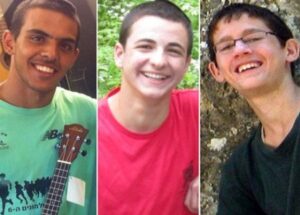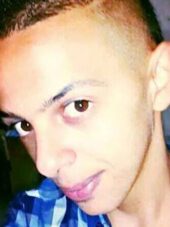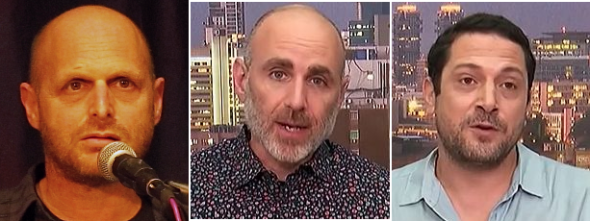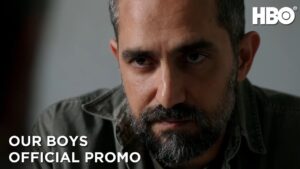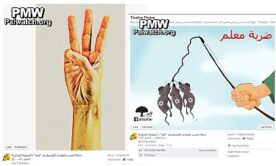- 484
- 514SHARES
CAMERA generally avoids addressing fictional TV shows, but the latest Israel-focused HBO series, “Our Boys,” claims it is “based on the true events which led to the outbreak of war in Gaza” during the summer of 2014 and interweaves truth with fiction. It has become so mired in controversy that CAMERA has reviewed the complete 10-episode series and explains why there is controversy surrounding it.
The Events of That Summer
The summer of 2014 was a traumatic time in Israel. On June 12, 2014, three Israeli teenagers – 16-year-olds Naftali Frenkel and Gilad Shaer and 19-year-old Eyal Yifrah – were kidnapped from a hitchhiking post in Gush Etzion (in the West Bank) by Hamas operatives. An extensive search operation, dubbed “Operation Brother’s Keeper,” was launched by the IDF and the Israel Security Agency (Shin Bet): Troops combed the area in search of the boys, targeting the Hamas terrorist infrastructure and arresting its members. Meanwhile, the nation banded together in solidarity with the families of the boys, praying for their safe return. A social media campaign, with hashtag #BringBackOur Boys, went viral, raising global awareness of the terrorist kidnapping and inspiring prayer on the victims’ behalf.
The agonizing search for Naftali, Gilad and Eyal continued for 18 days until June 30th, when security forces discovered their dead bodies buried in a field belonging to Hamas members near Hebron. After initially denying responsibility for the abduction/murders, a senior Hamas official later took credit for it, praising the “heroic action of the Kassam Brigades (Hamas’ armed wing).”
Hussam Hassan Qawasme, the mastermind of the attack, was arrested on July 11th and subsequently confessed to planning and financing the attack, having received funding from Hamas. He provided weapons to the terrorists, hid the bodies and destroyed the evidence. It was not until the end of September that security forces closed in on the perpetrators, Marwan Qawasmeh and Amer Abu Aisheh who were killed in a shootout during the arrest operation.
The crackdown on Hamas was met with a barrage of mortar and rocket fire into Israel from Gaza. According to the Meir Amit Intelligence and Terrorism Information Center, 52 missiles were fired into Israel during June 2014 and 237 missiles and dozens of mortars were fired in the first week of July. As the firing of rockets and mortars into Israel escalated, the IDF responded with air attacks targeting Hamas arms caches, launching ramps, and terror infrastructure. This turned into a 7-week war between Israel’s military and Hamas, which the IDF called “Operation Protective Edge”.
That summer’s trauma was intensified by the shocking and vicious murder of 16-year-old Mohammed Abu Khdeir from an Arab neighborhood in eastern Jerusalem, perpetrated by three Israelis bent on avenging the abduction/murders of the Israeli teenagers. The attack took place just hours after the funerals of Naftali, Gilad and Eyal, shocking and horrifying the entire nation. Rioting by the residents of Arab neighborhoods in Israel ensued. The three Israeli murderers, Yosef Chaim Ben David and two relatives whose names were not released because they were minors, were tracked down and arrested days after Mohammed’s burnt body was found in the Jerusalem forest. They were indicted in Israeli court and given life sentences (with the exception of one of the minors who was convicted of being an accessory to the murder and sentenced to 21 years in prison).
The Initial Backlash Against “Our Boys”
The series is a co-production of HBO, Keshet International, produced by Movie Plus. Although its title echoes the hashtag #BringBackOurBoys, the production is not about the Israeli teenagers who were the subject of the social media campaign. They and their families are seen only fleetingly in archival TV news clips. The series, instead, focuses on dissection of the brutal murder of Mohammed and the trial of his killers, with the abduction/murders of Naftali, Gilad and Eyal serving as a backdrop to establish the revenge motive of the Israeli perpetrators.
The filmmakers’ obsessive elaboration of the savagery perpetrated by the Israelis on Mohammed becomes most apparent only in the last part of the series, but was nonetheless the first controversy engendered by the production. The public backlash against the HBO series began in Israel as soon as the pre-release publicity revealed that the show would focus on the murder of Mohammed Abu Khdeir and his family’s grief rather than the murders of the Israeli victims and their families’ suffering. Indeed, the Palestinian perpetrators of the Israeli abduction and murders are not identified until the end of the series – and then, only to suggest that the Israeli justice system is harsher on Palestinians than on Israelis.
The series’ creators — Haggai Levi and Joseph Cedar, and Tawfik Abu Wael – anticipated the backlash and justified their choice of focus:
According to Levi:
We were drawn to understanding the perpetrators of this murder more than we were interested in understanding the victimhood of our side…For us, both dramatically and politically, understanding the aggression is crucial…Focusing on the victimhood creates more acts of revenge. Focusing on the aggression, at least as I see it, speaks to trying to stop it.”
According to Cedar:
…I look at the conflict we find ourselves in, a 90-year cycle of violence since 1929. I feel that those who tell the stories deal only with our sense of victimhood and this just encourages the next act of revenge. But if we deal with our aggressive side, how we turn pain into revenge, there’s a chance the cycle will end…
Certainly, the exceptional nature of Mohammed Abu Khdeir’s murder – its singular cruelty and the shocking identity of the aggressors – warrants attention: Throughout the years of the Arab-Israeli conflict, revenge murders by Jews have been rare and none exhibited such brutality.
But criticism of the series extends far beyond giving attention to Mohammed Abu Khdeir’s tragic murder. The production is criticized for distorting the truth about what happened, as it conceals certain aspects of the story while exaggerating or inventing other parts to imply that cruelty toward Arabs by Jews is not anomalous.
Some 120 bereaved families who had lost relatives to terrorist attacks in Israel protested to HBO about the distorted depiction, voicing concern that “people who watch the series overseas think that Jewish terrorism is equivalent to Palestinian terrorism – we kill them, and they kill us – when the situation is completely the opposite.” According to their letter:
“The kidnapping and the murder of the three youths is one of the many instances in which Jews have been murdered. The murderers receive … encouragement and are treated like heroes. In contrast, Mohammad Abu Khdeir’s murder was met with shock and condemnation by the vast majority of the Israeli public. Dozens of Jews are murdered as a result of the ongoing incitement by the Palestinian Authority every year. The Arab street does not condemn the murder of Jews and even supports and encourages it…. The State of Israel acted with determination to catch and punish Abu Khdeir’s murderers. In contrast, the Palestinian Authority rewards and glorifies the murderers of Jews. In camps and in schools, they praise [them] and teach them to follow in their path…”
The Views of the Show’s Creators
The filmmakers have re-created, in the series, their own subjective views of the events that took place, inventing fictional characters who embody their own beliefs. And if certain things are amplified and others ignored, it is because this reflects their own colored impression of the situation. The blurring of line between truth and fiction was a deliberate choice on the filmmakers’ part. They explained, “The idea was to create a unifying world where you don’t reveal what is documentary and what isn’t.” And, “The drama was the desire to influence and articulate artistic and political truth.”
Haggai Levi, the filmmaker who was originally approached by HBO, grew up in an Orthodox Jewish home but left the fold. His undergraduate degree is in psychology. For him, making the series was an opportunity for introspection and “soul searching.” He attempted to identify and understand what he saw as “the very deep, underground currents” in Israel’s Jewish society, particularly the Orthodox Jewish society, that created Abu Khdeir’s murderers. Levi states:
… It’s important for us to say that Abu Khadir’s murder did not come from nowhere. We tried to explain how a specific atmosphere takes a person whose soul is weak, and when some 100,000 people say ‘Death to the Arabs,’ he goes on to bring it to fruition.
Joseph Cedar, the filmmaker brought aboard by Levi, similarly left the Orthodox Judaism in which he was raised. For him, this was a rebellion against the notion that such cruelty by Jews was an anomalous event. According to him:
…Tens of thousands of Israelis take to the streets shouting, ‘Death to the Arabs!’, ‘Revenge, revenge!’ You could hear it all over town,”says Joseph Cedar. “The next day they find a body of a burnt Arab, and all of them without exception say: Jews couldn’t have done it! There’s a clinical term for this: Repression. Our story somewhat fractures our ability to repress. This murder should not have surprised anyone….the hatred within us is no different than that of the other side…
Tawfik Abu Wael is an Arab-Israeli filmmaker who was brought on to write and direct the Palestinian roles in the story. For him, it was about showing that the crime of the three Israelis reflects the dehumanizing and racist views of Israeli society as a whole. Abu Wael explains:
It was Israeli public opinion that was responsible for the murder of Mohammad Abu-Khdeir. At the end of the day, it was carried out by these three people. The fundamental mood of a society that hates Arabs, that no longer sees Arabs as human beings. It came to expression by three people who did not see Muhammad as a human being….There is an institutionalized racism of the police and the security system against Palestinians. They’re seen as enemies. They’re not treated as equal citizens. There are many everyday wrongs and crimes that you do not hear about. It’s just that in the case of Abu Khdeir it turned into a very large media event.
The Filmmakers’ Distorted Perceptions
These assertions represent highly subjective perspectives rather than objective truth. The message is not supported by the facts. And that is the root of the controversy and criticism.
Contrary to Levi and Cedar’s depiction of tens of thousands of Israelis taking to the streets to call for vengeance and death to the Arabs, there were reports of a single demonstration in the country following the funerals of the Israeli boys where the slogan “Death to Arabs” was chanted. Organized by a fringe group of extremists, it numbered a few hundred, not tens of thousands. The extremists were confronted by the police. According to reports from the time:
On Tuesday evening, police in Jerusalem arrested at least 47 ultra-nationalist Jewish demonstrators who chanted anti-Arab slogans and decried the lack of a government response to the killing of the three Israeli teens.
The demonstrators called out “Death to the Arabs” and “No Arabs, no terror attacks.” Many wore stickers and shirts expressing support for the slain ultra-nationalist rabbi Meir Kahane.
Police said one man was arrested after going into a McDonald’s with a mask and attempting to attack an Arab. Three more people were arrested nearby after attacking Arabs…
….The demonstrators’ march, which began at the Cords Bridge at the entrance to the city and continued along Jaffa Road to the Machane Yehuda market and Zion Square, blocked traffic and briefly brought the city’s light rail to a halt. (Times of Israel)
and:
Several hundred right-wing extremists in Jerusalem started demonstrating, some of them attacking Arab passers-by, as the families of the three murdered teenagers were burying their sons in Modi’in.
Five Palestinians were attacked, and two of them needed medical treatment. The extremists were engaged in violent confrontations with police in the capital’s center for several hours.
The police arrested 50 people suspected of involvement in the incidents. Public transportation in the center of town was disrupted for hours, and hundreds of youths ran through the downtown city streets yelling racist slogans and calling for revenge against Arabs. (Ha’aretz)
The Theme of the Series: Rampant Jewish Incitement
The core of the “Our Boys” story is informed by the false perception that overwhelming numbers of Israelis were marching in the streets calling for the deaths of Arabs. The disturbing, overarching theme woven throughout the slow-moving, and often tedious, 10-hour series is that the brutal act perpetrated by Israeli Jews was empowered by a considerable, benighted element of Israeli society bent on vengeance and hatred for the other, and should have been anticipated.
While they do not suggest that racism and bigotry is endemic throughout the entire Israeli society, the filmmakers create fictional characters who suggest that half the public is culpable – namely, the half with whom they do not identify. In this way they grossly exaggerate the extent of bigotry within Israel, playing on stereotypes of racist, bigoted, mysogynistic Orthodox rabbis and their followers.
The hero of the series is a fictional Shin Bet officer who goes by the alias “Simon” (played by Shlomi Elkabetz). He is the one who tracks down the culprits in Mohammed’s murder and helps indict them. Simon is portrayed as a sympathetic, noble and omniscient character who grew up in an observant Jewish home but left its fold, recognizing the bigotry of the society he abandoned.
Throughout the series, Simon inflates the extent of fanaticism and hatred within Israeli society, extending it to “half the country”. Unlike his colleagues, he anticipates a revenge attack by Jews. His harsh view of Israeli society is conveyed in pronouncements that include:
“You start arresting people for spewing hatred, half the country will be in prison…”
“Half the country was crying out ‘Death to Arabs’ and ‘Revenge’….”
“Tell me what this city is about, how there are insane Jewish protests, and we’re on high alert for retaliation.”
Conflating hope and mass prayers for the boys’ safety – real occurrences – with incitement to revenge attacks, the series casts peaceful Jewish prayer vigils as dangerous eruptions of frenzied fundamentalism and incitement.
Mohammed’s murderers are placed in the middle of a prayer session at the Western Wall that actually took place. Interspersed with archival news footage of the actual prayer session at the Western wall, the terrorists are seen fervently reciting psalms there, listening to news reports in the car on their way home from the prayer session, and loudly singing about prayer back at home. These scenes occur against the backdrop of Simon voicing concern that prayers and hope could incite revenge attacks. He says:
“It’s a balloon that keeps getting bigger, hope, hope, hope. When we find them dead, all this [mass prayers and concern] will blow up in our face…”
“Ask [the families of Naftali, Gilad and Eyal] to help us calm down this mass prayer thing…”
“The Jewish Division considers this frenzy [hope and prayer] as dangerous.”
“Maybe the emphasis is on prayers. I’m worried about the day after. What happens when it turns out the prayers go unanswered? There are extremists who can react very badly…”
When it is discovered that the perpetrators are Jewish, the omniscient Simon triumphantly announces “We can proceed. Our killers are Jews.”
The theme of a nation awash in rampant hatred and incitement is amplified by a character named Yochai, a hilltop youth who is in and out of prison for provoking violence. Not only is Yochai himself a hate-filled racist – at one point he accuses the hero, Simon, of having “a black soul, like a Gentile”– but he echoes Simon’s hyperbole about the numbers of Jews who harbor similar feelings. Among Yochai’s pronouncements:
“Revenge? In general? Yes, there’s a million people who want revenge on the Arabs after they watched the burial of 3 kids…”
Upon hearing about the murder of Abu Khdeir:
“It’s clear it was Jews… Because revenge is natural…it’s a given.”
“[Those who do not believe Jews were the perpetrators] are wrong. That’s part of the problem. Because you think Jews are incapable of cruelty toward their enemy.”
“I’m a small fry. There are thousands like me.”
And when entering the prison where Abu Khdeir’s murderers are being held, he tells them:
“The nation is with you. They’re afraid to say so, but everyone’s with you. You should know that. You did what many people felt had to be done, but they didn’t have the courage….”
Role Reversals: Who Incites Violence?
In one of the latter episodes, the theme of Jewish incitement against Arabs is further amplified through a Shabak agent who reports an escalation of incitement among Israeli Jews leading to numerous racist attacks against Arabs:
“Since the war began, there is a serious escalation. We’ve never seen a wave like this before. A one thousand percent increase in calls for incitement and violence against Arabs. We also have dozens of attacks against Arab cab and bus drivers. Death threats against left wing activists. Over 100 Facebook, Twitter, WhatsApp groups with racist elements. The thing is they’re posting with their real names, not even hiding – it’s something that has never happened before…”
The agent’s pronouncement reverses the historical facts.
Yes, there was indeed an escalation in incitement and terror attacks at the time, but it was not on the part of Israeli Jews targeting Palestinians. It was the opposite: Palestinians publicly celebrated the abduction and murders of the three Israeli boys with candy and song, glorifying the perpetrators.
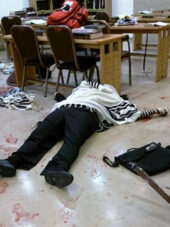
Nov. 2014: A bloody massacre of worshippers in a Jerusalem synagogue – one of the numerous deadly attacks by Palestinians on Israelis during this period
The mother of one of the Hamas perpetrators went on public TV to declare her pride in his actions. A song broadcast on Hamas TV praised the perpetrators and urged more kidnappings. Fatah leaders threatened violence and encouraged the slaughter of Israelis, distributing a song that promoted terror attacks. Hamas leaders vowed to destroy the Jews and encouraged young children to follow in the footsteps of those who carry out terror attacks against Israelis. Unbridled incitment urging violence against Israelis by Palestinian leaders, on Hamas TV stations and in the Palestinian Authority press, resulted in multiple, deadly terrorist attacks during that time: There were several deadly excavator and other vehicle rammings, multiple stabbing attacks, shooting attacks, and a massacre of worshippers at a Jerusalem synagogue, not to mention mortar shells and rockets being rained in on Israel from Gaza. Dozens of Israelis were killed and many more seriously wounded. The incitement was unrelenting and culminated in the 2015-16 stabbing intifada in which dozens more Israelis were killed or left fighting for their lives.
In contrast to widespread institutionalized incitement in Palestinian society, hate provocation within Israeli society was confined to a small fringe element: Ten members of a radical group, Lehava, were arrested by Israeli police for incitement. Nor were there “dozens of attacks against Arab cab and bus drivers.” There were reports of one stoning attack on an Arab cab, in which the driver was not harmed. Police arrested the perpetrators, four 13-year-old boys demonstrating over the stabbing murders of two Israelis by Palestinians likely encouraged by the rampant incitement by the Palestinian leadership.
The Series’ Villains
With Palestinian incitement and terror attacks absent from the series, the villains are the rabbis and communities of Hareidi Jews who are characterized as racist, corrupt and backward. This portrayal is vividly conveyed through the dialogue of Amitai, the husband of a fictional psychotherapist who previously treated the Jewish murderers. Amitai implicates the entire community for creating and harboring murderers, telling his wife:
“I know exactly where [the murderer] comes from, I’m very familiar with the education, I know the mentality… Have you ever talked to your neighbors? These are people who feed on hatred, racism and nationalism from Day One. Who are you protecting? Three Hareidi thugs. They’re plunging the country into the depths of hell.”
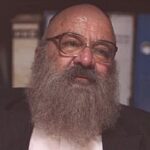 To emphasize the unscrupulous and tribalist nature of the community’s leaders, the character of fictional rabbi is created to embody all the negative qualities attributed to the ultra-Orthodox community by their detractors:
To emphasize the unscrupulous and tribalist nature of the community’s leaders, the character of fictional rabbi is created to embody all the negative qualities attributed to the ultra-Orthodox community by their detractors:
- He is a misogynist who refuses to directly address the psychotherapist facing him because she is female. Instead, he directs the conversation to her non-psychologist husband (which seems absurd, given that he was supposedly the one to have directly referred the patients to her).
- He is apparently unethical and tries to corrupt others, as well, as he tries to shield the murderers from facing justice. He attempts to coerce the psychotherapist to declare the murderers criminally insane and incompetent to stand trial, in contradiction to her professional opinion.
- The rabbi adopts an “us vs. them” appeal to the psychotherapist, as he says in a mix of Yiddish-Hebrew:
“What will they say? The media? The nations of the world? What will they say if a religious man, in his right mind did such a thing? Don’t you know what this means? That God forbid, this is the way of the Torah. We know that this is the exception of exceptions, but what will they say? Those Chareidim, those Jews, that’s their way. Is there any greater blasphemy of God’s name than that?”
The rabbi’s assistant approaches the psychotherapist to discuss their “understanding” and threatens, “We don’t want to sabotage that trust.” This gives Amitai another opportunity to incriminate the entire community and its leaders, as he proclaims:
“…Instead of your maneuvers, ask yourselves how these murderers came from within you. What about ‘Put the evil away from among you?’ You taught them that it’s either [attending a] yeshiva or nothing. So they wander in the streets committing crimes, acts of racism. And you want to wash your hands of this?…”
The false implication is that the murderers were not only nurtured by hatred and racism but received extensive support within their communities.
This same theme is emphasized through the characterizations of the still-Orthodox family of the hero, Simon. They display an us vs. them attitude as they deny the guilt of the Jewish murderers. Early in the series, when discussing incitement by another rabbi and his observant guests at a Shabbat dinner, Simon is still unwilling to accept these expressions of hatred as incitement:
“What incitement? My brother could have said the same thing. So could his kids and everyone I know…”
His colleague in the Shin Bet responds, “Those are the people who take the love of Israel to the most primitive, racist and non-Jewish place…”
Simon later comes to recognize the evil in which he has been raised. When his brother pleads with him to help the father and grandfather of the murderers, an Orthodox rabbi – a “holy man”, Simon incriminates the entire family and community:
“A holy man whose son is a murderer. Someone raised that murderer? Someone educated him? He grew up in someone’s home?”
To his brother who pins the murder primarily on one psychopath, Simon suggests that the murderers are rooted in the community (bringing up the two other cases where Jews were convicted of terror attacks on Arabs during the 70-year conflict):
“So one crazy man, that’s how you explain the murder?… There have been precedents – Baruch Goldstein, the Jewish Underground.”
Rabbis and members of the Orthodox community are shown using biblical references to justify racism and murder. At one point, one of the murderers tells another:
“You know ‘Thou shalt not kill’ does not apply to what we did? It doesn’t apply to Gentiles.”
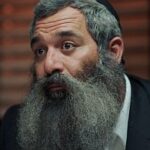 In another episode, a rabbi compares the murderers of Abu Khdeir as akin to the biblical zealot Pinchas. And in yet another episode, a Facebook post by Yochai again uses the biblical reference to Pinchas’ “act of zealotry” to describe the murderers’ action.
In another episode, a rabbi compares the murderers of Abu Khdeir as akin to the biblical zealot Pinchas. And in yet another episode, a Facebook post by Yochai again uses the biblical reference to Pinchas’ “act of zealotry” to describe the murderers’ action.
The father and grandfather of the murderers is portrayed as a prominent rabbi in the community who is concerned only with appearances and how the reputation of the rest of his family will be affected. In the series, he never condemns his family’s actions as morally reprehensible.
Missing from this portrayal of religious society is that, in fact, leaders and rabbis from across the spectrum – including the murderer’s father – harshly condemned the murder. Yosef Chaim Ben David’s father publicly condemned the actions of his son in the Israeli daily newspaper Yediot Aharonot. He said regarding his son’s indictment:
“Let them do whatever needs to be done. It’s very difficult for me with this whole situation. He has had psychiatric problems for many years…The shame is for all of us because it is forbidden to do such a thing. Forbidden according to our holy Torah and forbidden according to the law.”
Rabbi Aharon Leib Shteinman, leader of the Hareidi Ashkenazi community (who has since passed away), declared:
“This is a terribly severe deed which is forbidden and is not the way of the Torah…The path of violence and revenge are not our ways and anyone who does such things threatens the lives of the Jewish people.”
And Rabbi Shalom Cohen, the spiritual leader of Shas (ultra-Orthodox Sephardi community from whence the terrorists originated), similarly condemned the murderers:
“A person whose hands are stained with the blood of innocents is liable to the law of rodef (a pursuer who can be executed to prevent him from acting again).”
The religious media similarly condemned the attack and the murderers.
Amplifying Accusations of Israeli Racism
Amplifying accusations of Israeli institutionalized racism and unequal treatment made by Mohammed’s father, the filmmakers ignore relevant aspects of the story.
1) The Israeli authorities are shown to have taken their time in launching an investigation of Mohammed’s disappearance, in contrast to having immediately searched for the Jewish boys’ murderers.
The series thus completely ignores the fact that an emergency call to Israeli police from the abducted Jewish teenager, Gilad Shaer, was initially dismissed as a prank call. The search was therefore not launched immediately. The lag gave the kidnappers time to hide the bodies and escape. It took Israeli forces 18 days to find them. By contrast, the Shin Bet found and arrested the perpetrators of Mohammed’s murder within a few days.
2) The epilogue states that Mohammed’s parents, Hussein and Suha Abu Khdeir, appealed to the Supreme Court to demand the killers’ homes be demolished, but “the appeal was rejected,” implying that Israel refuses to treat Jewish terrorists as terrorists.
The Supreme Court ruling, however, clearly affirmed that the anti-terror regulation that allows for home demolitions “applies equally to Arab terrorists and to Jewish terrorists, each case according to its circumstances,” while noting that the practice must be carried out in the immediate aftermath of a terror attack in order to have a reasonable chance of deterring future attacks. The specific appeal in this case was rejected because there was a long delay between the attack and the filing of the appeal for demolition. The court has similarly stopped demolitions of Palestinian terrorists’ homes on the same grounds of a months-long delay between an attack and an attempted demolition. Retired judge Elyakim Rubinstein ruled that “the petition should not be granted, first and foremost given the considerable delay between the abominable act of murder and the petition’s submission,” noting that regulation 119—which allows ordering the demolition of a home where suspected terror activity occurred or a home of terrorists, their accomplices or supporters—applies both to Arab terrorists and to Jewish terrorists.
3) The epilogue also suggests that a lawsuit was to be filed by the district attorney for financial compensation from the killers but that the State Attorney rejected this on the grounds of lack of means within the killers’ families, implying again that Israeli Jews receive preferential treatment under the law.
What the show does not mention is that when Yosef Chaim Ben-David was sentenced in 2016 to life in prison plus 20 years, he was also ordered to pay the Abu Khdeir family 150,000 shekels in compensation. And both of the minors were ordered to pay the Abu Khdeirs 30,000 shekels, in addition to their jail sentences. The Abu Khdeirs were compensated by the State as victims of terrorism by Bituach Leumi (National Insurance), in the same way Israeli families who are victims of Palestinian terrorism are compensated. While the State had considered suing the killers for reimbursement of what the it had already paid out to the Abu Khdeirs, it abandoned that plan after finding that they did not have sufficient financial assets to reimburse the state.
Separately, once the appeals in the criminal case were exhausted and the killers’ appeals were denied in February 2018, the Abu Khdeirs were able to proceed with a civil lawsuit against them. In April 2018, the Abu Khdeirs filed a lawsuit against the three for 5.6 million shekels. It is still ongoing.
Selective, Edited News Clips
The first mention and identification of the Hamas murderers of Naftali, Gilad and Eyal is in a brief news clip about the demolition of the murderer’s homes. The only other place they are mentioned is in the epilogue that notes only that they “were shot to death during a raid on their hiding place.” Not mentioned or shown is the fact that they did not respond to calls for their surrender and that they shot at the Special Police Unit that had surrounded the house.
The only description of the Gaza War comes in brief archival news clips, only one of which mentions Hamas rocketing “following Abu Khdeir’s murder.” The other five clips are all about Israeli forces “intensifying damage to Hamas,” “dozens of casualties and total destruction in Gaza,” increasing “international pressure on Israel to stop the bombing,” Palestinian leader Nabil Sha’ath referring to an Israeli airstrike as “a war crime,” and Israel striking an UNRWA school “that provided refuge to many Palestinians.” There is nothing about the killings of dozens of Israelis including a young child and a Thai worker by terrorist rockets from Gaza and nothing about the repeated occasions of rockets found in UNRWA schools which UNRWA had handed back to Hamas.
The epilogue mentions city squares, streets and institutions, as well as Dabke festivals, named after Mohammed Abu Khdeir who is said to have become a Palestinian symbol for “the struggle against”Israeli occupation.” There are no clips or any mention of the city squares, streets, institutions, and festivals named for and celebrating Palestinian terrorists who have killed Israelis in deadly terrorist attacks and have also become symbols of resistance for the Palestinians.
There is no suggestion of Palestinian violence in any of the news clips that are shown, nothing about the large numbers of Palestinian attacks that killed, wounded and terrorized Israelis during this time—no clips of the songs, newscasts or speeches by Palestinian leaders calling on their people to kill Israelis, and no clips of the riots and bloody terror attacks on Israelis that resulted from this incitement.
Conclusion
What is emphasized?
In the last three episodes the murder is rehashed at least 9 times with multiple re-enactments, flashbacks, scenes of the prosecutor reading the detailed indictment to Mohammed Abu Khdeir’s father, then again of the father explaining it to the mother, scenes of those testifying at the trial, reading of the indictment and news reports of the indictment.
Exaggerated again and again is the extent of incitement, hatred, and support for the murderers in Israel and especially in the religious world.
Also emphasized repeatedly are Israeli strikes against Hamas terrorists.
What is ignored?
While Prime Minister Netanyahu and Naftali Frankel’s bereaved mother are shown condemning Abu Khdeir’s murder, the widespread condemnation in Israel from across the political and religious spectrum is completely ignored.
Also missing from the series is the institutionalized incitement against Israelis by the Hamas and PA leadership and the numerous deadly attacks by Palestinians against Israelis.
A series that exaggerates and inflates certain parts of the story while ignoring the other parts, and that misrepresents the details is one that strays far from the truth.
The problem is that the series purports to represent an honest and factual history of what happened. And its deviation from that fundamental is precisely the reason for all the criticism and controversy.

